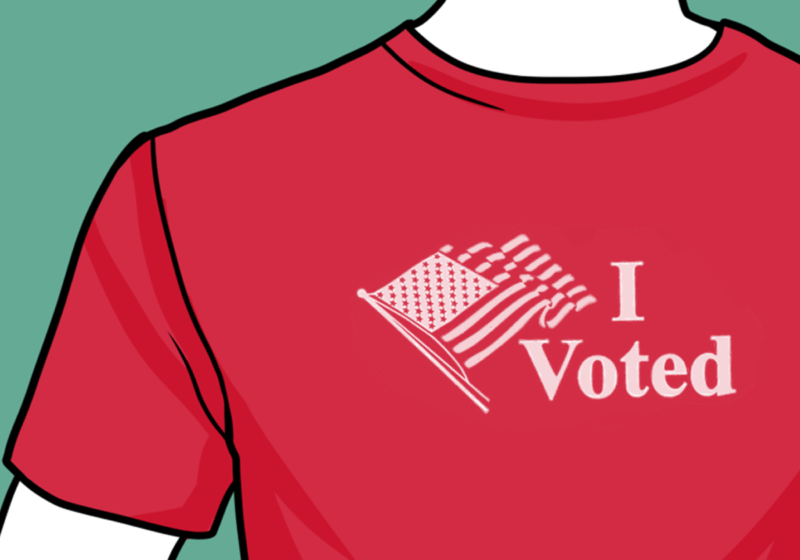The importance of political engagement can never be overstated. People’s rights are always on the line, even when the media spotlight has moved on to another tragedy.
Last week, one of the main tragedies was Ruth Bader Ginsburg’s death, which came with a side of Republicans jumping at the opportunity to overturn Supreme Court decisions like Roe v. Wade.
This year — and every other election (even the local, non-presidential ones) — there’s something you can do about it. You can vote.
The Black Lives Matter organizers in Rochester have been trying to galvanize protestors to march to the polls every night. Warning against the perils of sporadic engagement, volunteers have been walking around with clipboards to help register voters.
Yes, you need to protest and show up for causes you care about, but it means nothing without the follow-through. Participate in the democratic systems that facilitate change. Young people don’t vote enough. In the 2018 midterm elections, only 37% of eligible UR students voted. In the last presidential election, people between the ages of 18 and 35 were approximately one third of the voting-eligible population but only one fifth of actual voters.And it shows: The average ages of the House of Representatives and Senate are 58 and 63, respectively, while the average age of the U.S. population is 38.4. Both major-party presidential nominees should be running for the president of their nursing homes instead.
Wildfires continue to rage out west while the Trump administration threatens to further roll back environmental protections.
Our representatives will be dead before the rest of the planet goes up in climate change-induced flames. Why on earth would they care about the intangible future when Big Oil is offering to line their pockets right now for a few policy rollbacks?
Kids can’t compete with that kind of cash, and they serially undervalue the currency they do have: their votes.
Obviously, your individual vote is unlikely to be the tiebreaker; it’s about a cultural change. The more that young people vote, the more likely it is that politicians will take our generation-specific concerns seriously. So what’s the holdup?
Maybe you’re disillusioned with the idea of voting, because you look at all the system’s exploitative loopholes like gerrymandering and the Electoral College, and question the value of participating.
But you can exploit those loopholes, too.
A lot of us in Rochester are choosing between hopping in line in Monroe County on Nov. 3, or asking for an absentee ballot for our home county several weeks prior. For those of us from swing states, the choice seems obvious. But even if your state always goes blue, what about your county? Voter turnout in Monroe County gets as low as 30% in non-presidential election years.
Rochester’s Mayor Warren, who has allegedly broken election laws, who saw the footage of Daniel Prude’s murder at least a month before it was publicly released — and in that month, lied to other city officials about how Prude died — is up for reelection in 2021. The U.S. Senate is up for grabs this year, though that matters more if you’re not voting in New York. Most of campus is in a competitive district for the New York State Senate, and those living off campus in Rochester also likely are in a competitive State Senate district. Judges are also on the ballot in Monroe County.
While the presidential race captures the media’s attention, state and local races matter just as much if not more on issues of criminal justice, public health, and education. Besides, you as an individual will feel local politics more often and more intensely than you will national policy changes.
You might not personally care about the outcome of elections. But choosing not to vote is a massive insult to all of the people who cannot vote no matter how much they wish they could, no matter how much they’re affected by local, state, and national policies. Remember when international students taking online courses almost got barred from returning to campus this semester? Remember when whistleblowers exposed U.S. immigration policy for practicing a legal form of eugenics by forcibly giving women hysterectomies at ICE detention centers?
Eligible voters choosing not to engage in their civic duty is a huge middle finger to those whose rights — and lives — are on the line but who don’t get a say.
You should take voting seriously during any election year, but you need to be doubly sure you get it right this time around. The country is facing a voter disenfranchisement crisis the likes of which we’ve never seen.
In Pennsylvania, the Republican party filed a lawsuit demanding that “naked” ballots (ballots stuffed in one envelope instead of two) be thrown out.
Meanwhile, Republican officials in the Trump administration and state governments have discussed having state legislatures appoint electors that do not align with that state’s popular vote, especially to give Trump electoral votes for states that he does not win.
These aren’t well-intentioned attempts at reducing voter fraud or improving our democracy. These are bare-faced attempts at stealing your right to decide who leads your town, state, and country.
Nothing about this election cycle is normal. The president is hellbent on convincing his supporters that the election is “rigged,” and he hasn’t committed to a peaceful transfer of power if he loses. This is not what democracy looks like. These are warning signs that our political system and culture are morphing into something far darker.
Feel the urgency. Fight back. Request a ballot as soon as possible and vote early if you can. Our democratic experiment doesn’t have to end right now.
Check out these resources to help you register to vote, request an absentee ballot, and find your in-person polling location:
- UR’s Rochester Center for Community Leadership has an entire page to help University students navigate the complicated voting process, as well as a list of polling places for on-campus residents.
- U.S. Voting Foundation has a running database of election dates and deadlines, state voting requirements, and voting methods and options.
- Got a younger sibling? Vote.org — in addition to hosting dozens of resources for eligible voters — will send your under-18 friends a text reminder to register on their birthday.
The Editorial Board is a weekly Opinions article representing the view of the Campus Times, co-written by Editor-in-Chief Hailie Higgins, Publisher An Nguyen, Managing Editor Corey Miller-Williams, Features Editor Micah Greenberg, and Opinions Editor Lucy Farnham.






